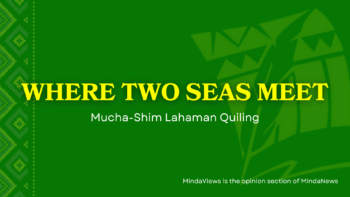One officer replied the American troops were here to conduct humanitarian work and help train our local military. They tried to be diplomatic and avoided answering the more politically-loaded questions such as a future withdrawal of troops here like that of Iraq. “As long as the Philippines requests us to be here (in the Philippines), we would stay,” one of them said.
American troops have been around Moro areas supposedly training our local enforcement authorities on intelligence and security work. What’s curious is that with the three-month kidnapping ordeal of the Red Cross personnel in Sulu , have our local forces been better trained in tracking down so-called terrorists?
Setting aside the military relationship the Moro areas have with Americans, American presence in Marawi, I told the MSU students, was a thing borne from the past, as part of a colonial legacy. During their Philippine occupation, the Americans did not just try to put up military camps in Lanao but they also became service-providers. The first hospital here, even the first secular schools were built by the Americans, even manned by them as administrators, teachers and medical workers.
In the 1970s, the Peace Corps were very visible around Marawi, particularly in the Mindanao State University. Norkaya Muhammad, a women leader here, recalls that she used to await toys and chocolate gifts from her American friends every time they arrived from the US. The gifts are reminiscent of a past where Datus were supposedly granted tokens and positions in exchange for territorial space of colonizers.
The Moro – US relationship was reiterated in a conference recently held in Davao during the International Solidarity Conference on Mindanao organized by the Mindanao People’s Caucus. MILF panelist Maulana Alonto said the US knew that the Moros in the South had not given any plebiscitary consent to forming part of the Filipinas Islands during the signing of the Treaty of Paris with Spain granting colonial rights over the Philippine islands to the US . Alonto reiterated the independence of Sultanate governments during the pre- Spanish period wherein Mindanao was named as such even before the Philippines was named after King Philip.
The Moros and Americans have had a love-hate relationship. The Autonomous Region in Muslim Mindanao (ARMM) is the biggest recipient region of US donor funding running by the billions annually. Yet the ARMM also hosted pockets of resistance to American presence in the past during the Bud Daho, Sulu and Bayang, Lanao massacres of sword-wielding Datus, chieftains and their followers.
While Moros are fans of American pop culture , they are deeply committed to Islamic ideals of virtue, shunning pork, alcohol and nudity. They can listen to Madonna but they would condemn American invasion of Iraq.
While Moros would question the ultimate agenda of the US in the South, some Moro intellectuals are looking to the US to provide recognition to the Moro claim for self-determination or governance. The US on the other hand would acknowledge
the injustice of the past colonization of Moro areas and yet cannot act on any political claims of Moros.
I recall one USIP fellow tell a forum of young Moro leaders, Moros need the outside world, they need allies to champion the Moro RSD (right to self-determination). They need to tell their stories and with the American public relations and media grinding our airwaves and webspace everyday.
Look, Bangsamoro day last March 18 was major in Moro areas but look at its practical absence in the major channels and newspapers. Hello, no coverage means nada in the agenda. You’re of zero importance.
With a stalemate in the GRP-MILF peacetalks, it is not uncanny to look for other windows of conflict-resolution.
Maybe the facilitator Malaysia needs to become more creative, and techno-savvy in its approach, involving the communities affected so that there is popular participation after a botched MOA-AD in August 2008. Maybe we need to rethink American participation with its strength on public relations, where the major media networks are based – CNN and Fox.
A lot of maybe’s but really, thinking out of the box can uplift the stalemate and probably make peace nearer soon. (MindaViews is the opinion section of MindaNews. Samira A. Gutoc is former secretary-general of the Philippine Muslim Women Council and former editor of the Moro Times.)
